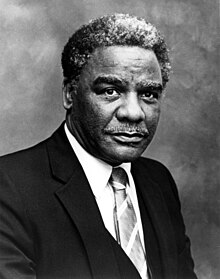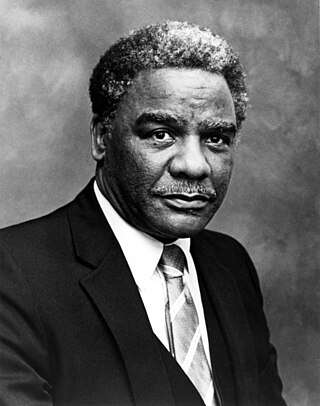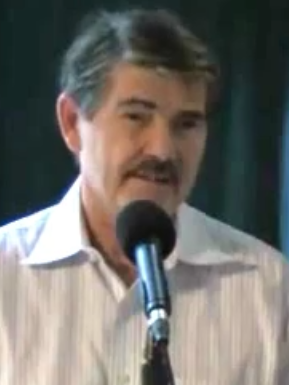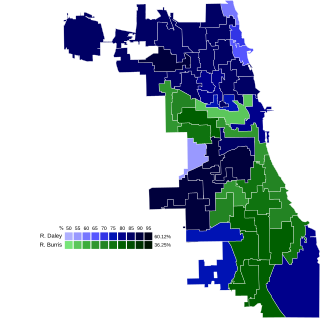

The Harold Washington Party was founded in Chicago in the late 1980s by Timothy C. Evans to represent the interests of the city's African-American population who felt disenchanted with the mainline Democratic Party. [1]


The Harold Washington Party was founded in Chicago in the late 1980s by Timothy C. Evans to represent the interests of the city's African-American population who felt disenchanted with the mainline Democratic Party. [1]
The party was created ahead of the 1989 special elections to fill the mayoral vacancy in Chicago created when Harold Washington, Chicago's first black mayor, died in office. It nominated a candidate for the 1989 special election for Chicago mayor as well as and several other offices in Cook County. The party's nominee in the 1989 special election, Timothy C. Evans received 41% of the vote.
In 1990, ahead of the Cook County elections, a court decision denied Harold Washington Party nominees ballot access, which was reported a boon to the Democratic Party slate. Ballot access was later reinstated though it required a jury-rigged solution to vote for their candidates because of how close to the election the decision was reached. [2] [3]
Additionally, R. Eugene Pincham left the Democratic Party and joined the Harold Washington Party after losing the Democratic nomination for President of the Cook County Board of Commissioners. The party did not do as well as they did during the 1989 special election but candidates for major offices such as County Clerk or Sheriff got around 8-16% of the vote, and the party received 10% of the total vote for Cooky County Commissioner seats, which did not gain them any seats. [4]
James R. Hutchinson, the party's vice-chairman, was going to be the party's candidate for the 1991 Chicago mayoral election, if Danny K. Davis secured the Democratic nomination; this did not happen and so Hutchinson stepped down so Pincham could be the party's mayoral candidate. Pincham received the endorsement of Davis shortly afterwards. The party wanted to expand their appeal and added white candidates such as Larry Machaj, a Polish-American businessman, to their slate. [5] Despite the change in candidates, Richard M. Daley won in a landslide against Pincham with him under-performing expectations. Daley increased his average vote share in predominately African American wards from nine to fifteen percent from the primary to the general election. Overall, Daley received 25% of the African American vote, including over 40% in two predominately African American wards. [6]
The following few years were chaotic for the party. In 1992, a dispute over a deal between the party and the Hudepohl-Schoenling Brewing Co., makers of Mt. Everest malt liquor, displeased half of the party. The brewery would donate 25 cents per case sold in African American neighborhoods in Chicago towards community projects. Joseph Faulkner, the party's Chicago's 8th Ward committeeman, criticized the move as a deal that will increase malt liquor sales in the community for the financial gain of party officials. Reed, the leader of the party, stating this was a way to reinvest part of the millions spent on malt liquor in the community. [7] During the 1992 County elections the party fielded only a single candidate: Doloris Jones for Clerk of the Circuit Court, who finished in a distant third place with 6.97% of the vote. [8] Shortly afterwards, Pincham left the party over a Republican-backed loan taken for the party. Hutchinson denied any ties to the Republican Party. [9] At the end of 1993 the party suffered a schism between the Progressive Independents of the Harold Washington Party, headed by Bruce Crosby, and the Harold Washington Party, headed by David Reed. The former viewed Reed's decision to endorse non-party candidates as treasonous. [10]
Up until the 1994 County elections, the Harold Washington Party never had primaries to decide on candidates, but since Crosby and Reed both ran for the Harold Washington Party nomination for President of the Cook County Board of Commissioners there needed to be one. Infighting occurred within the party during the election cycle with Baker, a member of the Progressive Independents of the Harold Washington Party, calling fellow party member Tyler a Republican in disguise. [11] The party fielded more candidates than the previous election this cycle, but they were still a distant third place in each election they participated in.
From this point on the Harold Washington Party would gain few votes. The party's candidate, Lawrence C. Redmond, had less than one percent of the vote in the 1995 Chicago mayoral election, and the 1996 County elections were the final elections for which the party fielded a candidate.

Jane Margaret Byrne was an American politician who served as the 50th mayor of Chicago from April 16, 1979, until April 29, 1983. Prior to her tenure as mayor, Byrne served as Chicago's commissioner of consumer sales from 1969 until 1977, the only female in the mayoral cabinet.

Harold Lee Washington was an American lawyer and politician who was the 51st Mayor of Chicago. Washington became the first African American to be elected as the city's mayor in April 1983. He served as mayor from April 29, 1983, until his death in 1987. Born in Chicago and raised in the Bronzeville neighborhood, Washington became involved in local 3rd Ward politics under Chicago Alderman and future Congressman Ralph Metcalfe after graduating from Roosevelt University and Northwestern University School of Law. Washington was a member of the U.S. House of Representatives from 1981 to 1983, representing Illinois's first district. Washington had previously served in the Illinois State Senate and the Illinois House of Representatives from 1965 until 1976.

David Duvall Orr is an American Democratic politician who served as the Cook County Clerk from 1990 to 2018. Orr previously served as alderman for the 49th ward in Chicago City Council from 1979 to 1990. He briefly served as acting Mayor of Chicago from November 25 to December 2, 1987, following the death of Mayor Harold Washington. Orr retired from the office of Cook County Clerk in 2018, opting not to run for an eighth term.

The Cook County Democratic Party is an American county-level political party organization which represents voters in 50 wards in the city of Chicago and 30 suburban townships of Cook County. The organization has dominated Chicago politics since the 1930s. It relies on an organizational structure of a ward or township committeeperson to elect candidates. At the height of its influence under Richard J. Daley in the 1960s when political patronage in employment was endemic in American cities, it was one of the most powerful political machines in American history. By the beginning of the 21st century the party had largely ceased to function as a machine due to the legal dismantling of the patronage system under the Shakman Decrees issued by the federal court in Chicago. The current Chair is Toni Preckwinkle, who is also the elected Cook County Board president.

Robert Eugene Pincham was an American attorney active in the field of civil rights who served as both a judge of the Circuit Court of Cook County and later a judge of the Appellate Court of Illinois.

The Chicago mayoral election of 2007 saw incumbent mayor Richard M. Daley win a landslide victory, garnering a 51-point margin of victory.

The Chicago mayoral election of 1995 resulted in the re-election of Democratic Party nominee incumbent Richard M. Daley over independent candidate Roland Burris, with 359,466 votes to Burris's 217,024. Daley won 60.1% of the total vote, winning by a landslide 24-point margin. The Republican candidate, Raymond Wardingley, fared poorly with only 2.8% of the vote. A fourth-place candidate, Harold Washington Party nominee Lawrence Redmond, won 0.9% of the votes.

The Chicago mayoral election of 1991 resulted in the re-election of incumbent Democrat Richard M. Daley to his first full four-year term. Daley had previously been elected to serve the remainder of Harold Washington's unexpired term in a special election held following Washington's death in office.

The Chicago mayoral election of 1989 saw Democratic nominee Richard M. Daley win election to the remainder of an unexpired mayoral term with a 14% margin of victory. This marked a return for the Daley family to the office of mayor. Daley was elected over Alderman Timothy Evans, the nominee of the newly formed Harold Washington Party, and the Republican nominee Ed Vrdolyak.

The Chicago mayoral election of 1987 saw the re-election of incumbrnt Democrat Harold Washington. Partisan primaries were held on February 24, followed by the general election on April 7, 1987. Washington defeated Ed Vrdolyak, the leader of the Vrdolyak 29, who ran on the Illinois Solidarity Party ticket. Former mayor Jane Byrne unsuccessfully challenged Washington in the Democratic primary.

The Chicago mayoral election of 1983 began with the primary on February 22, 1983, which was followed by the general on April 12, 1983. The election saw the election of Chicago's first African-American mayor, Harold Washington.

The Chicago mayoral election of 1975 was held on April 1, 1975. Democratic Party incumbent Richard J. Daley was elected to a record sixth term as mayor by a landslide 59% margin over Republican nominee John J. Hoellen Jr. Only one other individual has since matched Daley's feat of winning six Chicago mayoral elections. This was the first Chicago mayoral election since the ratification of the Twenty-sixth Amendment to the United States Constitution, which lowered the voting age from 21 to 18.

Chicago has held regularly-scheduled popular elections to select the city's mayor ever since it was incorporated as a city in 1837.

Elections were held in Cook County, Illinois, on November 5, 1946. Republicans took control of most county offices and occupied both seats of the Board of Appeals, although Democrats retained their majority in the Board of Commissioners. The Republican landslide reflected similar trends in state and federal elections at the time but was nevertheless unexpected. It resulted in the resignation of Democratic leader Edward Joseph Kelly and ultimately the end of his tenure as Mayor of Chicago. Republicans failed to capitalize on this victory in the following year's Chicago mayoral election, which was won by Democrat Martin Kennelly.
Michael F. Sheahan is an American politician and sheriff. He formerly served as Sheriff of Cook County, Illinois and as a Chicago alderman.

The Cook County, Illinois, general election was held on November 5, 1996.

The Cook County, Illinois, general election was held on November 3, 1992.

The Cook County, Illinois, general election was held on November 6, 1990.

The Cook County, Illinois, general election was held on November 8, 1988.

The Cook County, Illinois, general election was held on November 8, 1994.